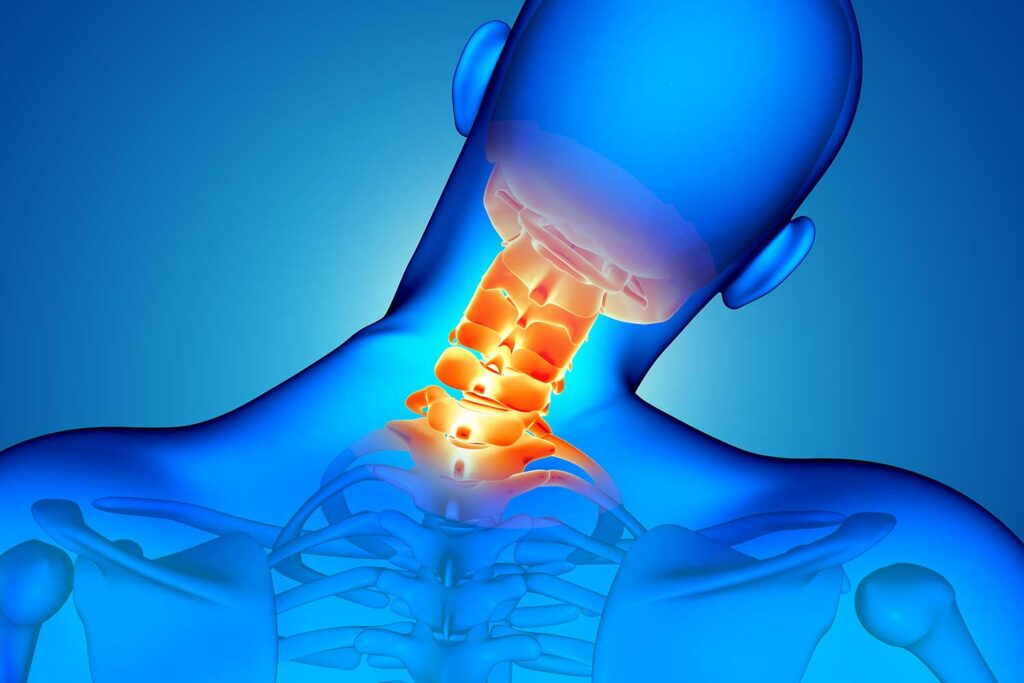
Spondylosis
What is Spondylosis?
Spondylosis, also known as spinal osteoarthritis, is a degenerative condition that affects the spine. It involves wear and tear of the spinal discs and facet joints, leading to changes in the spinal bones’ structure and function. As we age, the discs lose moisture and elasticity, causing them to become thinner and less effective as shock absorbers. This process can result in the development of bone spurs and decreased flexibility in the spine.
Types of Spondylosis
There are several types of spondylosis that can occur in different areas of the spine, including cervical spondylosis (neck), thoracic spondylosis (upper back), and lumbar spondylosis (lower back). Each type can cause specific symptoms and require different treatment approaches.
Tired of living in pain?
Risk Factors
Spondylosis is commonly associated with the aging process, as it is more prevalent in older adults. However, it can also affect younger individuals, especially those who have experienced spine injuries or have certain genetic predispositions.
Symptoms
Symptoms of Spondylosis: The symptoms of spondylosis can vary depending on the location and severity of the condition. Common symptoms may include:
- Chronic pain and stiffness in the affected area.
- Limited range of motion and flexibility.
- Radiating pain or numbness in the arms or legs if nerve compression occurs.
- Muscle weakness in the affected region.
- Headaches and dizziness in cases of cervical spondylosis.
Causes
The primary cause of spondylosis is the natural aging process that affects the spine. However, other factors can contribute to its development, such as:
- Repetitive stress on the spine due to certain occupations or activities.
- Spine injuries and trauma.
- Genetic factors that may predispose individuals to early degeneration.
Diagnosis of Spondylosis:
To accurately diagnose spondylosis, our pain management specialists will conduct a comprehensive evaluation, including a thorough medical history, physical examination, and diagnostic tests such as X-rays, MRI scans, or CT scans. These tests help identify the extent of the degeneration and rule out other potential underlying conditions.
Interventional Modalities for Spondylosis:
GTI Pain Associates offers a range of personalized treatment options to alleviate spondylosis-related pain and improve your overall function. Depending on the severity and location of the condition, treatment options may include:
- Medication management to reduce inflammation and alleviate pain.
- Physical therapy and targeted exercises to strengthen the supporting muscles and improve flexibility.
- Epidural steroid injections to reduce pain and inflammation.
- Facet joint injections to relieve pain in specific areas of the spine.
- Radiofrequency ablation to interrupt pain signals from affected nerves.
- Minimally invasive procedures and regenerative therapies to promote healing and tissue repair.
If you or a loved one is suffering from spondylosis, contact GTI Pain Associates today. Our dedicated team of pain specialists is ready to provide compassionate care and tailor treatment plans to suit your individual needs.
Visit your nearest GTI Pain Associates and LHI Pain Associates Today
We have four convenient locations in Texas: Beaumont, Nederland, Humble, and Baytown. Don’t let spondylosis hold you back from enjoying life. Take the first step towards a pain-free future. Contact us now to schedule an appointment and start your journey to a more comfortable and functional lifestyle. Conquer spondylosis with GTI Pain Associates and embrace a brighter, pain-free future.

